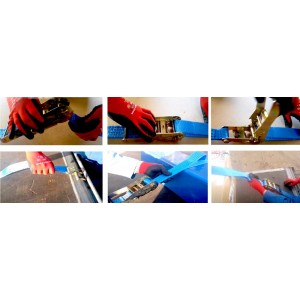
When travelling with any load, it’s crucial to ensure that load is secured correctly. Loads moving around in your vehicle can be extremely dangerous, if the load becomes loose it could potentially cause injuries or an accident.
By tying down loads correctly using ratchet straps and/or lashings, your loads will be safe and secure without any worry of becoming loose and moving around when on the road.
In this guide, we take a look at how to use ratchet straps, the main uses for them and the types of ratchet straps you can choose from.
A ratchet strap (also known as a tie-down strap) is a durable and high-strength webbing strap with a strong metal ratchet action handle with lock used to connect one strap to another and securely tension down to hold the load. The webbing of a ratchet strap is softer than the chains used with load binders and therefore is less likely to cause damage to the load.
Predominantly for tying down cargo and securing items together, ratchet straps are used for general securing of equipment and materials but are most common in the construction field for tying hardware down safely and securely and fastening goods on pallets, containers, trucks and trailers.
If you’re wondering how to tighten and release ratchet straps you’ll be pleased to know that the process is relatively easy and can take just a few minutes to set up.
Start by opening the handle of the ratchet and ratchet the axle until the open slot is pointing up, then close the ratchet for easier accessibility. Feed the webbing through the axle slot from underneath the ratchet and then hold the ratchet hook into position. Remove any slack between the hooks by pulling the free end of the webbing and raising and lowering the ratchet handle in a pumping motion.
When you notice the straps showing more tension as it tightens and secures the load in place, close the ratchet handle to lock the strap in place. When it comes to releasing ratchet strips, simply pull and hold the release handle until the ratchet handle opens. The strap will then become loose. There is a really useful video here.
When storing your ratchet, it’s important to keep them in a dry location to avoid mildew and out of the sun to reduce brittleness and prevent the ratchet from losing its strength. Of course, it’s important to check before every use that the straps are in good condition and aren’t damaged in any way, otherwise, it may not be safe or effective to use.
However typical polyester ratchet straps are UV resistant, water-resistant, provide low stretch qualities and even greater durability, meaning that you’ll be able to use the ratchet straps for much longer in time. With polyester having a great resistance to chemicals, oils, mould and mildew, it makes a great material for external environments.
We have a wide range of ratchet lashings to choose from, all the way from small to heavy-duty. The main types of ratchet straps vary in sizes, including 25mm, 35mm, 50mm and 75mm wide. We are also able to supply bespoke ratchet straps which can be made to your exact requirements, tailored to any length, width or fitting.
At Lifting Gear Direct, we supply ratchet lashings to meet any requirement, whatever your cargo restraint needs are, whether you need ratchet straps, load binders, cam buckles, rope or chain.
We also have a range of different ratchet handles/buckles which you can choose from including long and short handle varieties and wide or narrow versions. We supply stainless steel ratchet handles which can be of great benefit in marine applications.
Not found what you’re looking for or need some additional information? We are always ready to help wherever possible.
Speak to our team by calling 01384 76961 or fill in our contact form to discuss your requirements today.